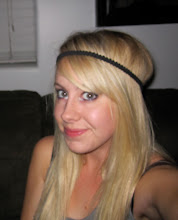For those of you who haven't read it, 1984 was written by George Orwell in 1949 as a sort of warning of what the world could look like in 1984. In a time when the fear of totalitarianism was strong, Orwell envisioned a future world where people are basically stripped of their ability to think and act freely, and society is ruled by the collective-thinking Party and "Big Brother." BB (I call him BB because I'm busy) is an all-knowing leader who is always watching, and come to think of it, reminds me of the Wizard of Oz, because no one ever actually sees him. In fact, no one knows if he actually exists, but the Party certainly believes and will make others believe that he exists. Either way, BB always knows what's up, and any person acting or thinking in a way considered unorthodox, is sure to be punished.
Our hero (would we call him a hero?), Winston Smith, is a party worker with the job of re-writing publications and changing recorded facts wherever the Party sees fit. If there is a news article written about a person receiving an award, and that person becomes a political heretic, the original article is destroyed or re-written to show the person in a negative light. Winston's job, in essence, is to revise the past. In Oceania, the setting of the story, history is changed whenever necessary. However, Winston is obsessed with the true past, the past he remembers. He does not understand how people could accept ideas that are not true so easily and willingly, and tries to keep himself sane by focusing on absolute truths. The party uses the word "doublethink" which is the ability to accept two different truths at one time. For example, one may know that two plus two equals four, but if the party says that two plus two equals five, one must also accept this as true. Winston finds this a difficult, if not impossible concept to grasp, which automatically makes him an outcast. He is completely against the Party and BB and does everything in his power to rebel against it. Unfortunately, in a society that is under constant surveillance, rebellion is not easy. Winston quietly acts out by having a secret apartment, engaging in a love affair with another party member, and eventually joining the Brotherhood, an organization against the Party. Anyway, I could go on forever, and since I don't believe in spoiling stories' endings, I won't give any more plot details.
I definitely enjoyed this book. The convincing world created in the story gave me chills and held my ordinarily wandering mind throughout the entire book. What intrigued me most were the metaphysical themes in the story. One of the antagonists (I won't give away his identity!) talks with Winston about about the meaning of reality and how the only thing that is really real is what we create in our minds. He explains that the past only exists in records, which can be altered or destroyed, and in minds, which can be manipulated. Therefore, the past does not exist, in the literal sense of the word. The only thing that exists is our current reality. The Party, who's motto, among others is "Ignorance is Strength," creates a reality for the citizens of Oceania to believe in, and by creating this reality, exerts absolute power over everything and everyone.
Since I tend to write like I think, spastically and nonsensically (are those actually words?), I should probably spare you any more confusion and shut up. I really enjoyed the book and that's all that matters. Don Quixote by Miguel de Cervantes is next on my list, and judging by the size of it and the amount of footnotes on almost EVERY page, it might be awhile before my next post. Wish me luck!
